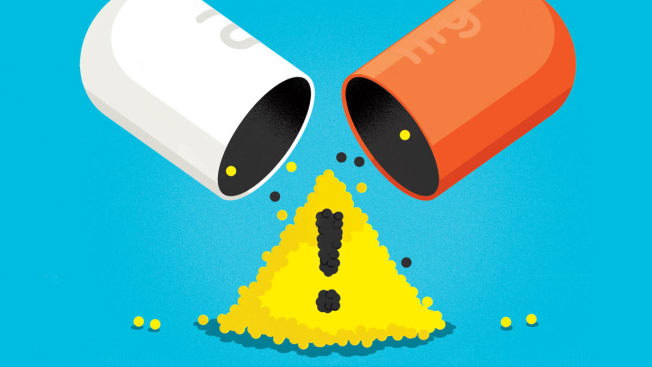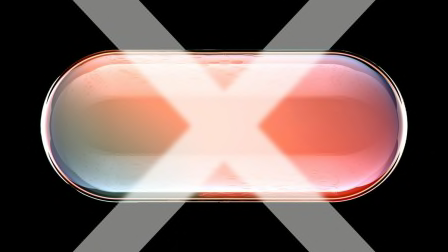Can Your Medications Make You Sick?
Drug side effects can be more serious than you might think, but a few smart steps may help protect you

You’ve settled in to watch your favorite TV show when an advertisement for a prescription medication comes on. It includes a litany of potential side effects: cough, trouble swallowing, dizziness, muscle cramps, diarrhea, skin blisters. You may have seen other drug ads mention the possibility of more severe effects, such as liver or kidney failure, blood clots, cancer.
Over the last decade, older adults in the U.S. sought medical care more than 35 million times for drug side effects, and more than 2 million were admitted to a hospital. In 2018, serious effects (often called adverse drug events, or ADEs) led to an estimated 9,000 U.S. deaths, according to the Lown Institute, a nonprofit that focuses on improving healthcare.
Side effects are certainly a concern. But determining how common those you’re hearing about in ads may be—or whether you’re likely to experience them—can be hard. Here is a clear-eyed look.
What Do Those Drug Ads Mean?
Side effects are on full display in drug ads because the government requires pharmaceutical companies to be transparent about potential problems. Print ads must list all possible serious side effects of a drug and others that occur frequently but are less problematic.
Why Age Matters
Still, as we age, it’s important to pay attention to side effects, especially when starting a new drug or changing a dose.
Research suggests that older adults are more likely to experience side effects more intensely. For instance, a dose of a hypertension drug you took without any issues in your 40s or 50s may now lower your blood pressure too much, making you dizzy and prone to falls. That’s because your liver and kidneys become less effective at metabolizing and removing medication from your body over the years, says Chad Worz, PharmD, chief executive officer of the American Society of Consultant Pharmacists.
The more meds you take, the greater your chance of side effects. (The Lown Institute has found that more than 40 percent of older adults use at least five prescription drugs monthly, and nearly 20 percent take at least 10.) Taking multiple meds regularly can also lead to a "prescribing cascade," says Sharon See, PharmD, an assistant professor in the Brookdale Department of Geriatrics and Palliative Medicine at the Icahn School of Medicine at Mount Sinai in New York City—where you need even more medications to deal with additional side effects.
How to Head Off Problems
First, ask your doctor whether lifestyle strategies such as a change in diet, exercise, or stress management techniques might be as effective as adding a drug.
Not an option? Before considering a new med, go over your current drugs with your doctor. "It’s especially important for people who take five or more medications to review all medications (including OTC and supplements) with their doctor to be sure the drugs are still necessary, the doses are appropriate, and a new drug won’t interact with others," says Paula Rochon, MD, MPH, director of the Women’s Age Lab at Women’s College Hospital at the University of Toronto.
Also, have your doctor or pharmacist tell you about common side effects, and let them know about any unusual past reactions to meds. And ask what the smallest effective dose may be for you. Older adults "need lower doses to get the same effects they may have gotten when they were younger," says Worz.
Dealing With Drug Side Effects
If you experience a side effect, tell your doctor promptly. Don’t stop the drug unless the doctor advises it; going cold turkey may be harmful, says Gina Ayers, PharmD, geriatrics clinical pharmacy specialist at the Center for Geriatric Medicine at Cleveland Clinic.
For minor issues, such as stomach upset, giving it a little time may help. Most doctors advise sticking with a medication for a couple of weeks to see whether side effects ease, says Ayers.
Check the package insert and label for information and ask your doctor what may help. For example, taking some drugs with food may curb a nausea side effect, a drug that makes you sleepy during the day may be able to be taken at night, and chewing sugarless gum may work for dry mouth.
If, after a few weeks, you’re still bothered by side effects, ask your doctor whether they can lower your dose or prescribe a different drug. Another med might not have the same side effects. Still not enough? Have your doctor help you weigh the risks of living with a medication’s side effects with the benefits it provides.
For the lowdown on medications that should be used only for a brief time, go to CR.org/stopmed.
When Allergies Interfere
Up to 10 percent of all negative reactions to medications are due to an allergy, according to the American Academy of Allergy Asthma & Immunology. Common culprits include over-the-counter pain relievers such as ibuprofen, as well as prescription antibiotics, anti-seizure drugs, monoclonal antibodies, and chemotherapy drugs.
Symptoms of an allergic reaction can include rashes and itching, cough, nausea, vomiting, and diarrhea. Most are mild and not dangerous, at least when you initially take a drug.
However, "true allergic reactions become more severe with every exposure," Worz says.
So when starting a new drug, if you have what you think is a mild allergic reaction, it’s wise to tell your doctor as soon as possible. And if you have breathing problems or your throat or face swell, seek immediate medical help—such as calling 911.
Take Extra Care With Certain Drugs
Some drugs are more likely to cause side effects than others. Work closely with your doctor (alert them right away if you think you’re having side effects), and get monitored properly if you’re using:
- Anticoagulants (blood thinners) like warfarin, apixaban (Eliquis), and rivaroxaban (Xarelto), insulin, and clopidogrel (an anti-platelet drug). These drugs are most frequently associated with emergency room visits for medication-related harms in older adults, according to a study published in 2021. Some anticoagulants hike bleeding risks, for instance; insulin may lower blood sugar too much in older adults; and anti-platelets can raise bleeding and dizziness risks. Note: Taking anticoagulants in tandem with ibuprofen or naproxen can raise bleeding risks further, Ayers says. (On their own, these OTC painkillers can lead to internal bleeding and higher blood pressure, so use them judiciously.)
Older adults should generally avoid the following, says Ayers:
- Benzodiazepines like diazepam (Valium) and alprazolam (Xanax), and sleeping pills like zolpidem (Ambien). All may raise fall risks.
- Anticholinergics like amitriptyline (Elavil) and imipramine (Tofranil), incontinence drugs like tolterodine (Detrol), and OTC meds like diphenhydramine (Benadryl) and ranitidine (Zantac). These can cause confusion, blurry vision, constipation, urinary problems, and dry mouth.
- Opioids are associated with dizziness, drowsiness, constipation, and slowed breathing.
Editor’s Note: This article also appeared in the March 2023 issue of Consumer Reports On Health.




















